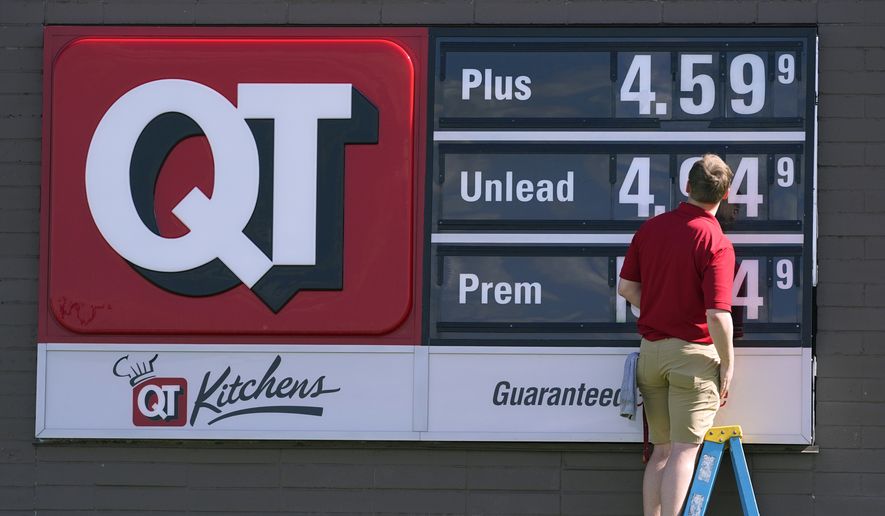The national average price for a gallon of gas is projected by Sunday to top $4.80, twice as much as the day President Biden took office.
It is a staggering milestone that underscores both the everyday pain inflation inflicts on Americans and the difficult months ahead for Democrats seeking votes in November.
The average price per gallon was $2.40 on Jan. 20, 2021, based on an average of the leading fuel-monitoring services. The average price on Friday was $4.78 and market analysts expected it to tick up at least 2 cents over the weekend.
The average American drives 13,476 miles per year, according to the Department of Transportation. That means owners of the Ford F-series — the most popular truck in 2021 — on average would spend roughly $3,060 per year at today’s price point compared to about $1,540 per year at $2.40 per gallon. For Honda Civic drivers, that would mean roughly $1,950 compared to approximately $980 in 2020.
Mr. Biden this week conceded that there is little his administration can do in the interim to provide relief on rising energy costs and other everyday items. He warned Americans that inflation across the economy is — at least for now — here to stay.
“There’s a lot going on right now but the idea we’re going to be able to click a switch, bring down the cost of gasoline, is not likely in the near term,” he said. “We can’t take immediate action that I’m aware of yet to figure out how we’re bringing down the prices of gasoline back to $3 a gallon.”
SEE ALSO: Biden administration raises amount of ethanol that must be blended with gas
The gloomy outlook marked a change in tune for Mr. Biden, who has previously expressed optimism — at least publicly — that administration actions would blunt costs. The president has struggled with messaging on energy prices, pivoting from downplaying the spikes as temporary to blaming price-gouging corporations or Russian President Vladimir Putin.
Republicans consistently point the finger at Mr. Biden’s anti-fossil fuel policies and advocacy for a clean-energy economy.
Major supply shortages from the pandemic persist globally, creating a volatile market that’s been exacerbated by the war in Ukraine that has much of the world turning its back on Russian oil.
Add to already high gasoline prices the annual increases for the summer holiday travel season in the U.S.
Analysts say don’t expect fuel costs to deflate anytime soon.
Mr. Biden has failed to assuage Americans’ concerns. With rising prices and voter dissatisfaction, the White House has recently begun a monthlong public relations blitz on inflation.
SEE ALSO: Economists say grain shortage will raise cereal, sushi prices
A Reuters-Ipsos poll released this week showed that 52% of respondents disapproved of Mr. Biden’s overall job and that his approval rating was 42%. The latter is a 6-point increase from his record-low approval rating of 36% the week prior.
The most recent example of false or misleading statements on energy costs from Mr. Biden came earlier this week.
He wrote in a Wall Street Journal op-ed about combating inflation that utility companies told him if his climate plan would be adopted — which it has not been due to a lack of support in Congress — the average family’s annual utility bills would be reduced by $500.
A Washington Post fact-check awarded that claim four Pinocchios. The number actually came from a research report that estimated household energy costs — not utility bills — could see a $500 decrease by 2030 — eight years from now.
On separate occasions months apart, Mr. Biden has aggressively pushed the narrative that gas prices would begin to drop with releases from the strategic petroleum reserve. Energy analysts warned such claims were misleading because it was doubtful the releases would produce even marginal — if any — noticeable differences.
Following separate releases at the end of 2021 and earlier this year, fuel costs continued to tick upward. The administration is currently releasing one million barrels of oil per day through October, which failed to prevent weekly all-time highs.
Energy experts emphasize that presidential administrations often receive both outsized credit and blame for gas prices. Former Presidents George W. Bush, Barack Obama and Donald Trump all received criticism or praise for energy prices that were arguably out of their control.
Even so, the cost of gasoline can be — and often is — an administration’s worst nightmare. Voters are presented with gigantic, flashy signs and billboards advertising the daily price wherever they drive.
With each penny that gas prices tick further into record territory, the threat grows of a voter backlash against the party in power.
“Joe Biden’s war on American energy has forced families across the country to empty their wallets to fill their tanks,” Republican National Committee Chair Ronna McDaniel said in a statement. “Unfortunately, Biden is doubling down on his disastrous agenda because he’s not the one paying the price — the American people are.”
• Ramsey Touchberry can be reached at rtouchberry@washingtontimes.com.




Please read our comment policy before commenting.